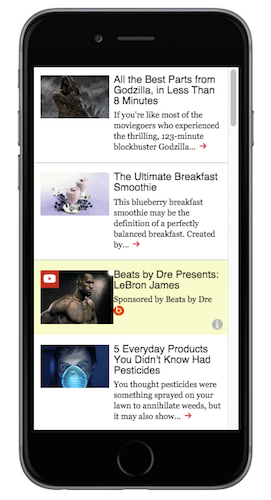For publishers, the good news about native ads is that they are unique, blending into the style of a particular digital publication.
The bad news: They’re unique. That makes it more difficult to handle them by computerized — that is, programmatic — ad platforms that can immediately find the highest prices advertisers are willing to pay.
Today, native ad automation firm Sharethrough is announcing a new version of its supply side platform (SSP), Sharethrough for Publishers, which it says is the first independent platform to support a new standard for programmatically handling native ads. And, because that could open the floodgates to spammy native ads, they are also unveiling a new feature called Content Quality Score (CQS).
The San Francisco-based company serves native ads to the websites, mobile websites, and apps of about a hundred premium publishers, including Time, TMZ, Men’s Health, Gannett, and Forbes. Previously, those native ads have been handled through Sharethrough’s proprietary system, so advertisers could only work through the company’s sales team.
Advertisers could not work through real-time bidding platforms that provide mass, automated buying of available ad space by advertisers. Facebook Exchange has offered native ads through real-time bidding since late 2013, but that was oriented toward the social networking giant.
A few other SSPs and advertisers’ demand-side platforms (DSPs) have also offered native ads, also through their own homegrown solutions.
The new native ad standard that could dramatically change this structure is in version 2.3 of OpenRTB. It was formulated by the Interactive Advertising Bureau for real-time bidding systems and formally approved less than two months ago.
VentureBeat is studying email marketing tools.
Chime in, and we’ll share the data with you.
It solves the problem of selling uniquely formatted ads on a mass scale by describing the content — the headline, thumbnail image, brand name, brand name, body content — via metadata tags. Once sold, the tagged content is then served into each publishers’ uniquely designed templates.
Publishers can now make more money from native ads, because there will be wider and more efficient bidding. And native ads, popular as a format among both publishers and advertisers, could now become as common as display, video, and other digital ad formats.
Opening up native ads to mass, price-determined buying could threaten their quality, however. Native ads sold in volume via computerized systems could mean that advertisers will pay more to place info about “legal steroids” into the native ads of, say, a Time magazine or a Men’s Health.
Although native ads are identified as different from straight editorial content by a different color, a label, or other means, they resemble the main content. That means their content cannot be too far afield from the publication’s, or else the publisher risks trashing their own brand.
The native ads running through the Sharethrough platform often use content that has appeared elsewhere. A native ad by Fidelity about the risks of retirement investment running on Fortune’s website could well employ a Fidelity-commissioned article that has run in other places.
Sharethrough’s Content Quality Score, which the company says is unique to its service, searches out that content in its other locations. The content is rated for social sharing, user engagement, sentiment analysis, and other qualities to determine if it meets the standards of a given publication before it passes through the platform.
But native ads that are custom-written for a given publication — for instance, a Time-only ad by Sony about how to pick a new HDTV — will not be so rated, since they wouldn’t be offered to multiple publishers through the Sharethrough platform.


